AI4Society Dialogues – Season 2

How will AI shape society and how will society shape AI? AI4Society Dialogues talks to leading researchers across the disciplines at the University of Alberta, a global leader in artificial intelligence research. The podcast explores how researchers are constructing and using AI in the course of their work and examines opportunities, challenges and concerns as AI becomes an increasingly prevalent aspect of our world.
Episode Ten: Marilène Oliver: Knowing our virtual selves
Some artists work with clay, or paint, but Dr. Marilene Oliver works with a digitized version of the human body. Her work explores the zeros and ones that we become when WE are rendered into data. Dr. Marilene Oliver is Assistant Professor of Visual Art at the University of Alberta. Her work is at the crossroads of new digital technologies, traditional print, and sculpture – producing objects that bridge the virtual and the real worlds. We talk about her inspiration for using medical scan data as raw material for artistic creation, the personal connections in her work through use of her own data and that of family members, biometric data and the role of our bodies in fuelling AI, her latest project that aims to bring “life” to a body of data to train and AI system, creating an ethics guidance for artistic creators and the tension she feels in seeing the harms of our current AI reality while hoping for a better future.
Find out more about Know Thyself as a Virtual Reality.
“I’ve just witnessed a really positive way that AI is changing a society (in the Faroe Islands) making it much more affluent…I see the evidence of how AI can be really positive. But in my work, I tend to be very cautious and anxious about AI. I worry that it’s a lot of control and focuses on things that mean we lose our humanity.” – Marilène Oliver
Dr. Marilène Oliver is an assistant professor of printmaking at the University of Alberta, Canada. Dr. Oliver studied Fine Art at Central Saint Martins and the Royal College of Art, London, UK where she obtained an MPhil with research project ‘Flesh to Pixel, Flesh to Voxel, Flesh to XYZ’. She has exhibited internationally in both private and public galleries including MassMoCA, Knoxville Museum of Art (USA) Frissarias Museum (Greece), Casino Luxembourg (Luxembourg), Fundació Sorigué (Spain) and The Glenbow Museum (Canada). Her work is held in a number of private collections around the world as well as a number of public collections such as The Wellcome Trust, Victoria and Albert Museum and Knoxville Museum of Art. In 2019 Dr. Oliver led and curated the exhibition Dyscorpia: Future Intersections of the Body and Technology and in 2020, the online exhibition Dyscorpia 2.1. She is also the host of LASERAlberta, a public series of art and science events and currently leads the research project ‘Know Thyself as a Virtual Reality’.
AI4Society Dialogues 2, Episode 10

Episode Nine: Padma Kaul: Epidemiological approaches in women’s health data
Women are disproportionately affected by heart failure after heart attacks and underrepresented in clinical trials. This lack of medical data about women hinders our ability to really understand the impacts some medications have on women. Dr. Padma Kaul is working to change this. We talk about her eclectic background that led to her work in epidemiology, why she’s passionate about women’s health and “getting the data”, her personal connection to her research focus on cardiovascular diseases, underrepresented groups in epidemiological studies and the
“Fewer women tend to be enrolled in clinical trials…my colleagues and I are trying to increase enrollment for women….the underrepresentation of women in general cardiology trials is a limitation. There’s been some research to suggest that because cardiology has been a male dominated field, maybe male physicians are more likely to enroll male patients….now everyone is aware that is something that needs to be fixed.” – Padma Kaul
Dr. Padma Kaul is an epidemiologist and a Professor in the Department of Medicine in the Faculty of Medicine & Dentistry at the University of Alberta. She is also co-director of the Canadian VIGOUR Centre, the Canadian Institutes of Health Research Sex and Gender Science Chair in Diabetes and the Heart and Stroke Research in Cardiovascular research.
AI4Society Dialogues 2, Episode 9
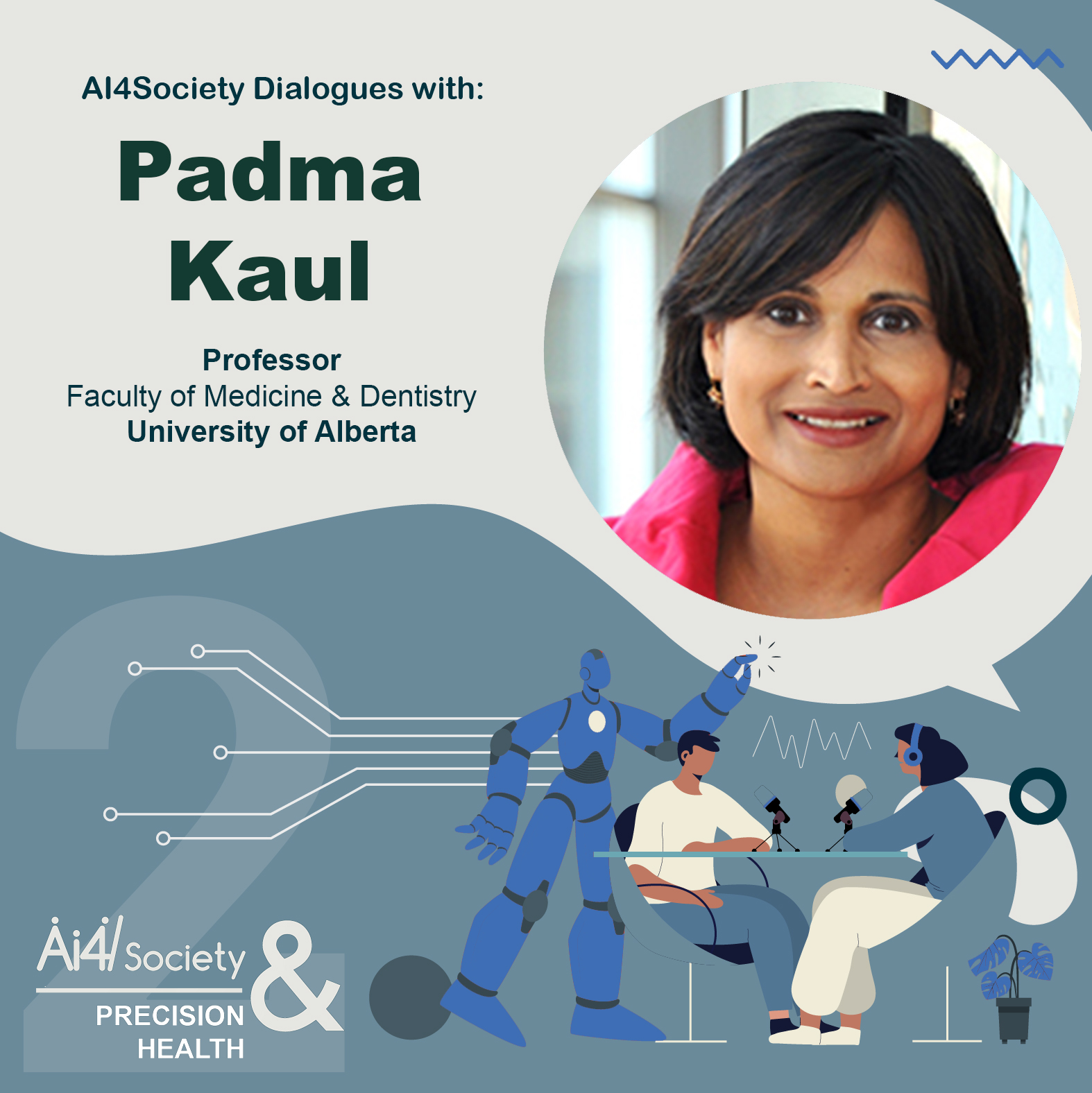
Episode Eight: Bo Cao: Machine learning and mental health
According to the Canadian Mental Health Association, in any given year, 1 in 5 people in Canada will personally experience a mental health problem or illness and by age 40, about 50% of the population will have or have had a mental illness. How might advances in precision health change how we address mental health problems? Dr. Bo “Cloud” Cao research interests include developing tools to enable personalized diagnosis and treatment for mental disorders, brain development and aging as well as neuromodulation and neurofeedback. We talk about the brain and the new, quantitative approaches to psychiatry made possible because of big data, the tools he’s developing to support the personalization of mental health treatments, the ethical use of data, how he addresses missing or lack of data in underrepresented populations and the importance of being part of an interdisciplinary team in order to develop real world solutions.
“Computational psychiatry…involves the use of more and more data from all modalities – imaging, genetics, medical records…all of this allow us to apply machine learning to the field of psychiatry. We can now investigate problems in new ways – it’s no longer just about doing one clinical trial.” – Bo “Cloud” Cao
Dr. Bo Cao is an assistant professor and Canada Research Chair (CRC; Tier 2) in Computational Psychiatry at the Department of Psychiatry, University of Alberta (UAlberta). Trained in mathematics (BSc), psychology (MSc), computational neuroscience (PhD), neuroimaging and psychiatry (postdoc), Dr. Cao has a strong passion for understanding the fundamental mechanisms of how the brain works and how to cure the brain when the mechanisms are disturbed. Dr. Cao’s main research interests are computational psychiatry and precision medicine in mental health, brain development and aging, general aging, and neuromodulation and neurofeedback.
AI4Society Dialogues 2, Episode 8
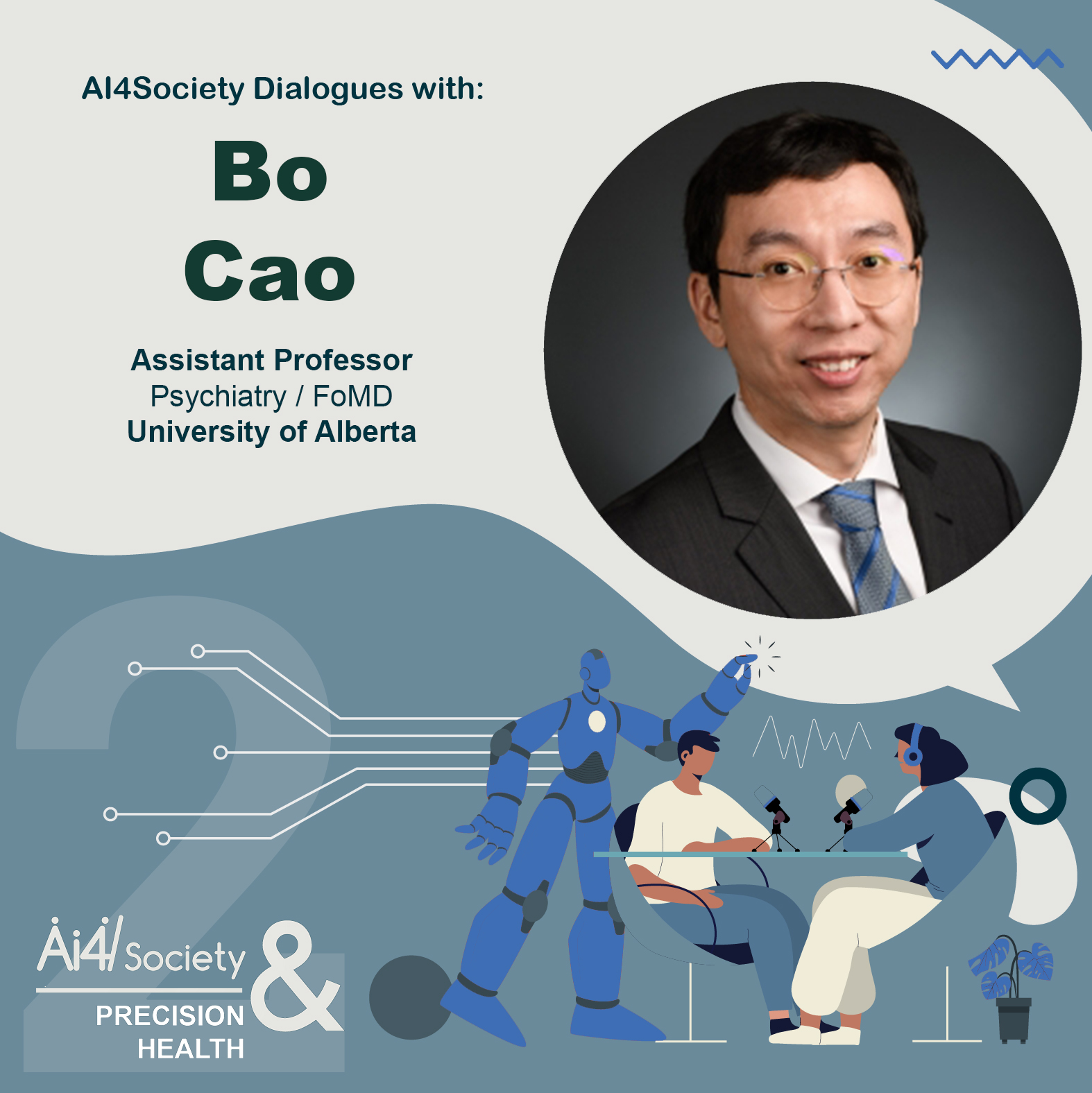
Episode Seven: Adriana Rios Rincon: Social robots and assistive technologies
As advances are made in artificial intelligence, questions are being raised about how we should relate to AI, especially when it’s embodied intelligence. In other words – how will we relate to robots? Dr. Adriana Ríos Rincón is a researcher who uses robots in her work with children. We talk about her thoughts on artificial intelligence, the importance of play in her research (and what she does for fun), how AI intersects with assistive technologies and her work to democratize access to these technologies and the role of robots in care.
“AI can potentially help rehabilitation professionals detect early stages of cognitive decline that precedes dementia in older adults. Using alternative means such as playing video games may be more interesting or engaging for older adults than the application of standardized screening tools and can be used for monitoring cognitive status in a playful way” – Adriana Ríos Rincón
Dr. Adriana Ríos Rincón is Assistant Professor, Department of Occupational Therapy, Faculty of Rehabilitation Medicine at the University of Alberta. Her current research is devoted to investigating the use of assistive technologies to assess and promote cognitive skills and engagement in play in individuals with disabilities, mainly those with motor and cognitive impairment including those living with dementia.She is also interested in exploring the use of information and communication technologies and artificial intelligence to support decisions about transitions across the continuum of care in older adults and individuals with disabilities.
AI4Society Dialogues 2, Episode 7
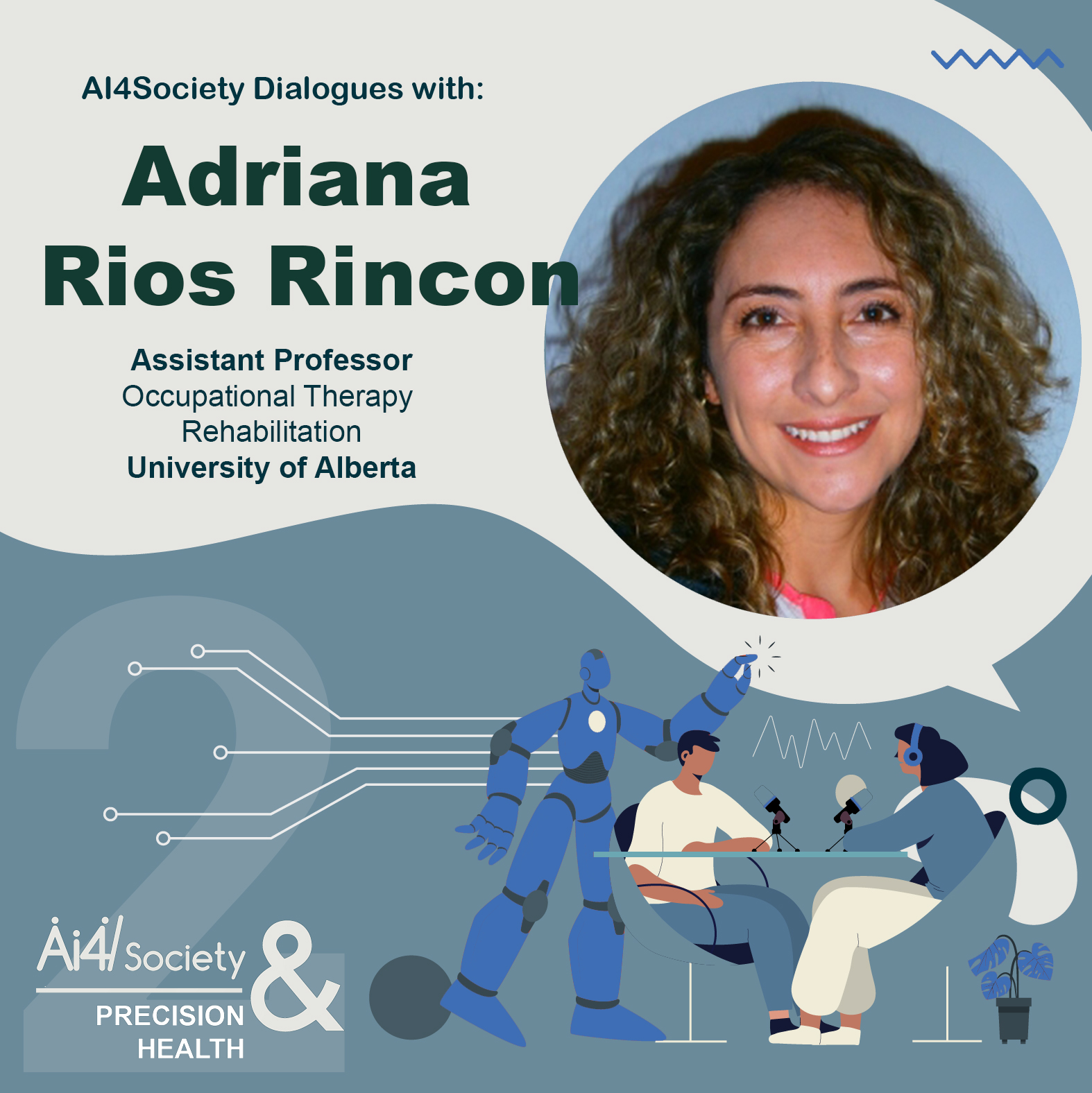
Episode Six: Jacob Jaremko: Envisioning medical scan data as the 21st century stethoscope
A stethoscope is a functional device, used to examine a patient…but it’s also become an enduring symbol for the use of technology in patient care. Yet…when it comes to advances in technology – what might a new, 21st century stethoscope look like? Dr. Jacob Jaremko believes that with AI enabled technology, we can transform medical imaging at the point of care. We talk about his thoughts on artificial intelligence in the context of medicine, his journey from an undergrad civil engineer to medical student to the world of artificial neural networks, what he’s learned in becoming an entrepreneur and thoughts on healthcare data, AI and ethics.
“Diversity is absolutely crucial to innovation. The way to produce innovation most reliably and effectively is to take smart people from different backgrounds and put them together in a room to solve a problem…everyone sees it differently…and new ideas come out of that. ” – Jacob Jaremko
Dr. Jacob Jaremko is a pediatric musculoskeletal radiologist, who is an Associate Professor and AHS Endowed Chair in the Faculty of Medicine at the University of Alberta. He’s also a Canada AI Chair and CIFAR fellow. Dr. Jaremko has been working with artificial intelligence since 1999, completing his PhD thesis in biomedical engineering. More recently, he co-founded MEDO, one of Alberta’s most promising health tech startups.
AI4Society Dialogues 2, Episode 6
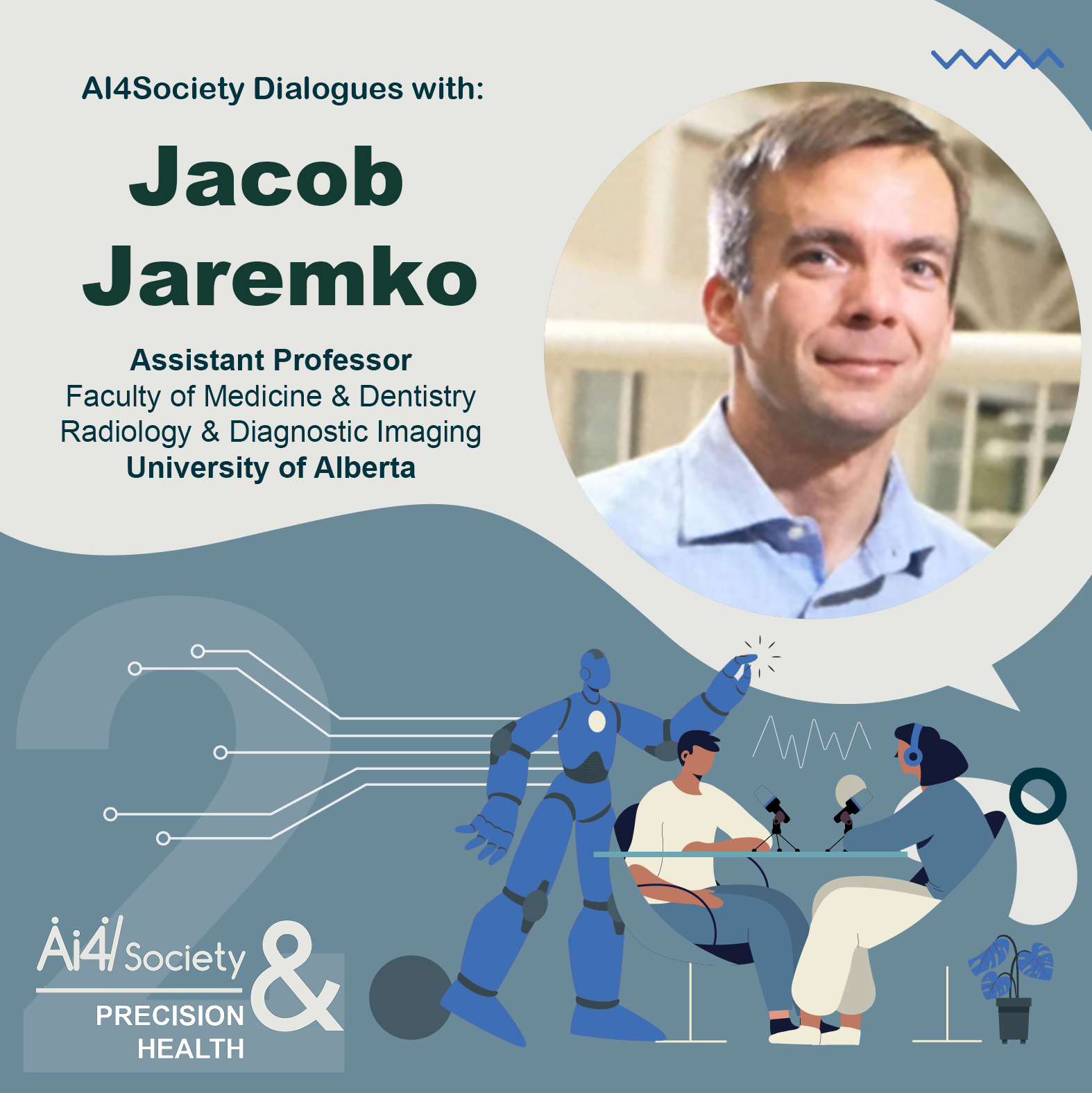
Episode Five: Nilanjan Ray: Advances in computer vision supporting diabetes research
Computer Vision is a field within artificial intelligence that is having significant impacts in medicine. Automated analysis of medical scan images can provide rich sources of insight and machine learning techniques to process this data open up a realm of possibilities for both researchers and clinicians. Dr. Nilanjan Ray is a leading researcher in computer vision, image analysis and visual recognition with deep learning. His current focus includes the application of cutting edge computer vision techniques to advance research in diabetes treatment. We talk about how he “accidentally” landed in this field, how computer vision works, the challenges of executing decision making using AI, how he is using generative adversarial networks to advance medical research (not for deep fakes!) and the role of technology in democratizing healthcare.
“In order to make that kind of (diabetes) treatment available…there is almost no choice but to use AI to bring the costs down to scale up (delivery)” – Nilanjan Ray
Dr. Nilanjan Ray is Professor of Computer Science at the University of Alberta. His research is in computer vision, image analysis and visual recognition with deep learning. His work includes medical imaging and general computer vision applications including classification, recognition, semantic segmentation, object tracking, image registration and motion detection. Dr. Ray has served as General Co-chair for AI/GI/CRV conference in 2017, Associate Editor for IEEE Transactions on Image Processing (2013-2017) and IET Image Processing (2016-), reviewer for NSERC DG and CRD grants.
AI4Society Dialogues 2, Episode 5
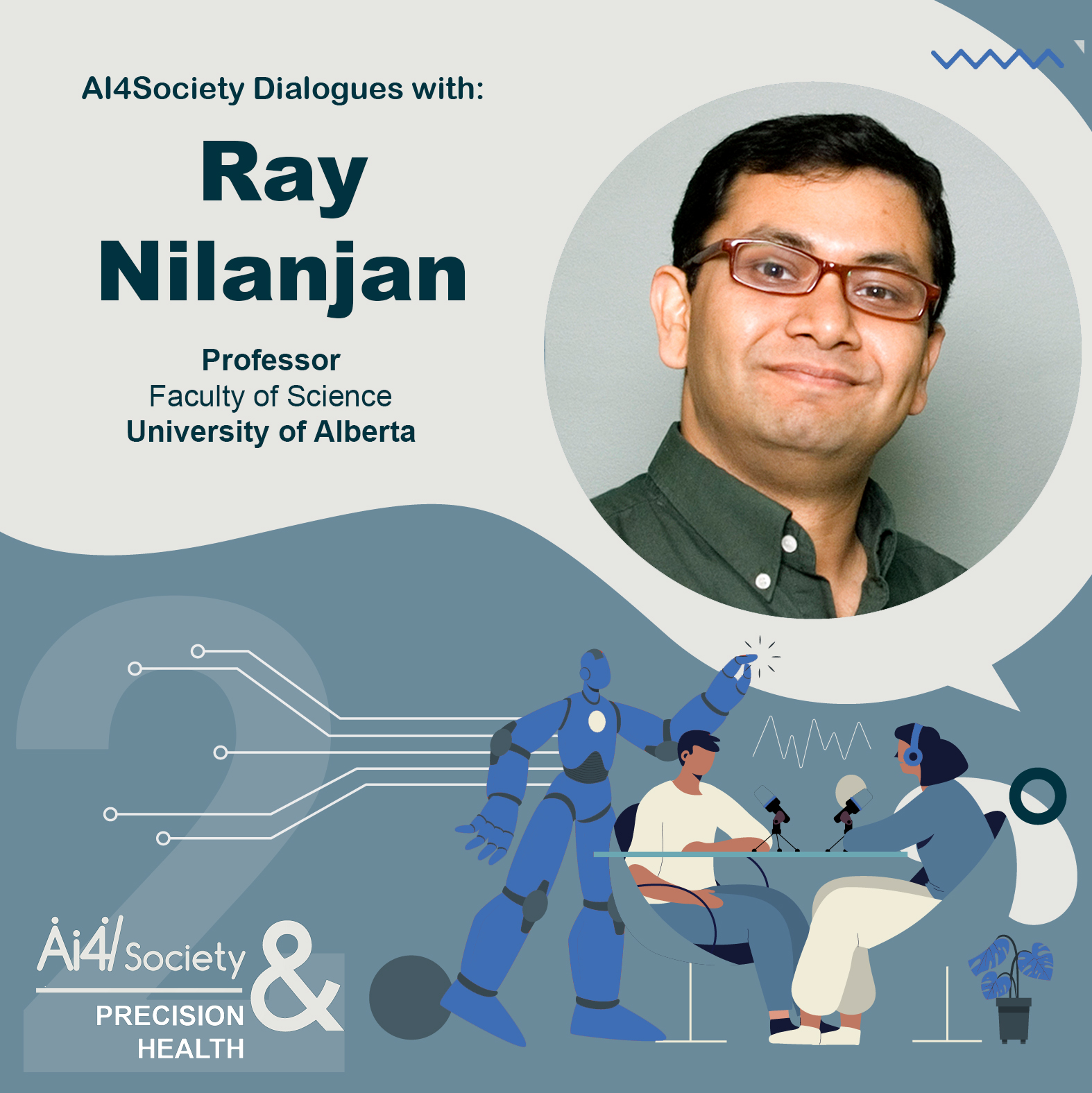
Episode Four: Adam Kinnaird: Predicting cancer to drive early interventions
What if we had better ways to predict cancer and a tailored plan to intervene early in the process? Dr. Adam Kinnaird is conducting leading edge research in the area of prostate cancer, which affects 1 in 7 men in Canada throughout their life. We talk about his research into early interventions in cancer, why prostate cancer is so hard to diagnose, using AI/ML techniques in precision diagnostics, surgical robots, interdisciplinary research collaboration and why he’s excited about the future of precision medicine.
“Prostate cancer is a spectrum, [from low to high risk]…my particular research looks at the patient population for low risk prostate cancer…and doing active surveillance. We’re trying to better risk stratify men…we are using advanced imaging techniques, MRI and micro-ultrasound …as well as next generation genetic sequencing… We’re trying to come up with a composite risk score at the individual patient level.” – Adam Kinnaird
Dr. Adam Kinnaird is Assistant Professor, Faculty of Medicine and Dentistry, surgery department, at the University of Alberta. He is a urological surgeon and graduated as a Vanier Scholar with the Governor General’s Gold Medal at the University of Alberta. Dr. Kinnaird is an award-winning researcher and recently completed an international fellowship at UCLA.
AI4Society Dialogues 2, Episode 4
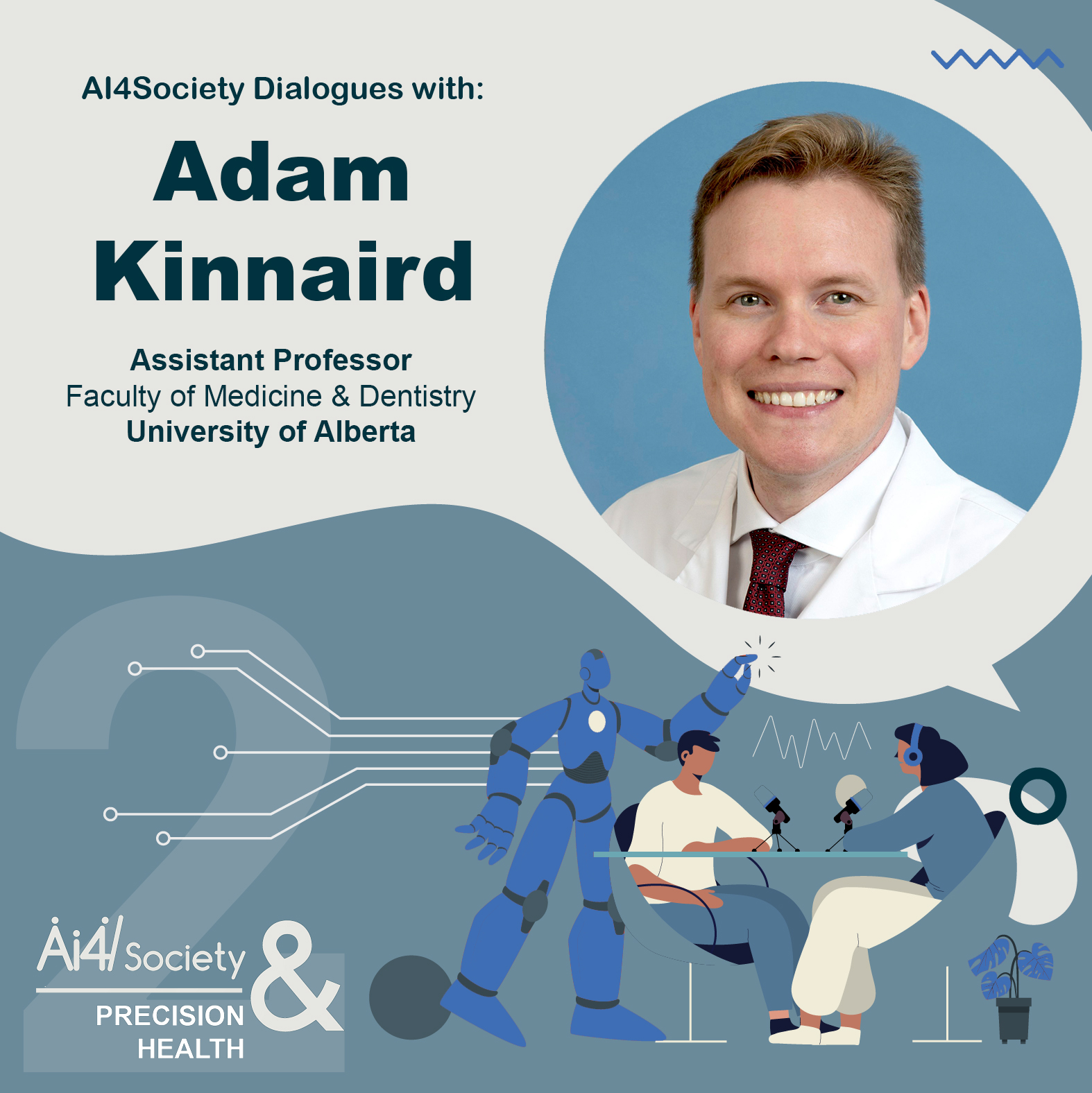
Episode Three: Daniel Baumgart: Data, Virtual Care and Precision Health
Advances in digital innovation, including artificial intelligence, are rapidly changing the face of both healthcare research and the delivery of care. In his work as a clinician, professor and researcher, Dr. Daniel Baumgart is working to advance precision medicine on all of these fronts. We talk about his early interest in computers, why he chose to pursue an MBA in addition to his medical background, his research on Crohn’s disease and his recent work on virtual care, why Alberta can play a leading role in digital health innovation, and being a clinician during the COVID-19 pandemic.
“Healthcare is delivered in three classical settings – an outpatient clinic, the emergency room and the hospital. There are huge gaps between those encounters….a lot of information from patients (data, feedback) is lost because they only meet us in these classic encounters. In the future…we will be going to (the patient)…they will participate more in their healthcare experience. Which will be part of the driver of digital health and will produce the data that artificial intelligence needs to shine.” – Daniel Baumgart
Dr. Daniel Baumgart is the Director of the Division of Gastroenterology in the Department of Medicine, at the University of Alberta. Dr. Baumgart holds an MD, PhD and an MBA, and is a Fellow of the Royal College of Physicians. He is a founding member of the University of Alberta Precision Health signature area and leads research with the Alberta Precision Health Innovation, Research and Technology Ecosystem. His list of accolades, funding and partnerships are numerous. He has been the principal investigator on over 200 multinational clinical trials. Recent research areas include projects on AI-enabled decision support systems, digital health and virtual care.
AI4Society Dialogues 2, Episode 3
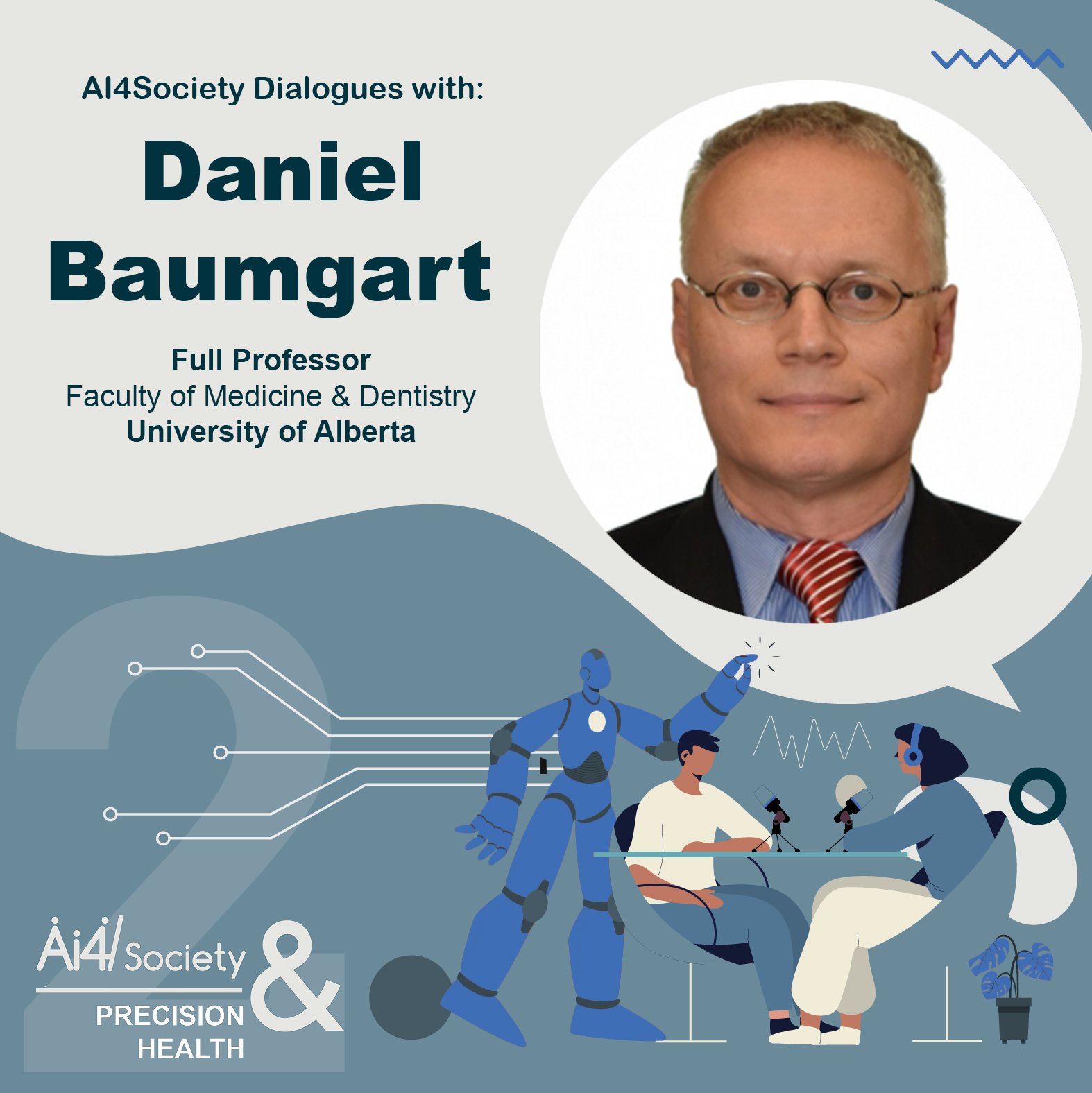
Episode Two: Alona Fyshe: Understanding computer “brains” and human brains
When we think about how artificial intelligence works, we often make comparisons to the human brain. Terms like neural networks seem to cement this connection. How much do computer models and the human brain have in common, especially when it comes to processing language? Dr. Alona Fyshe is a computer scientist with research interests that combine computational linguistics, machine learning and neuroscience. She draws on all of these areas to study the ways in which human brains and computer models process language. We talk about her journey from the arts to artificial intelligence, moving from industry to academia, women in AI, the remarkable ways in which human brains and computers represent concepts similarly and what this means for future work in this field and for the future of medicine.
“It’s very clear neural network models do not do the same thing the human brain does….but…two systems (the human brain and computers) “trained” on completely different data and for completely different prediction problems, show up with similar representations…I think that’s interesting and worth further exploration.” – Alona Fyshe
Dr. Alona Fyshe is an Assistant Professor in the departments of Computing Science and Psychology at the University of Alberta. She is a fellow of the Alberta Machine Intelligence Institute and holds a CIFAR AI Chair. She received her BSc and MSc in Computing Science from the University of Alberta, and a PhD in Machine Learning from Carnegie Mellon University. Dr. Fyshe uses machine learning to analyze brain images collected while people read, which allows her to study how humans represent the meaning they encounter in text, and how they combine words to understand higher-order meaning. She also studies how computers learn to represent meaning when trained on text or images.
AI4Society Dialogues 2, Episode 2
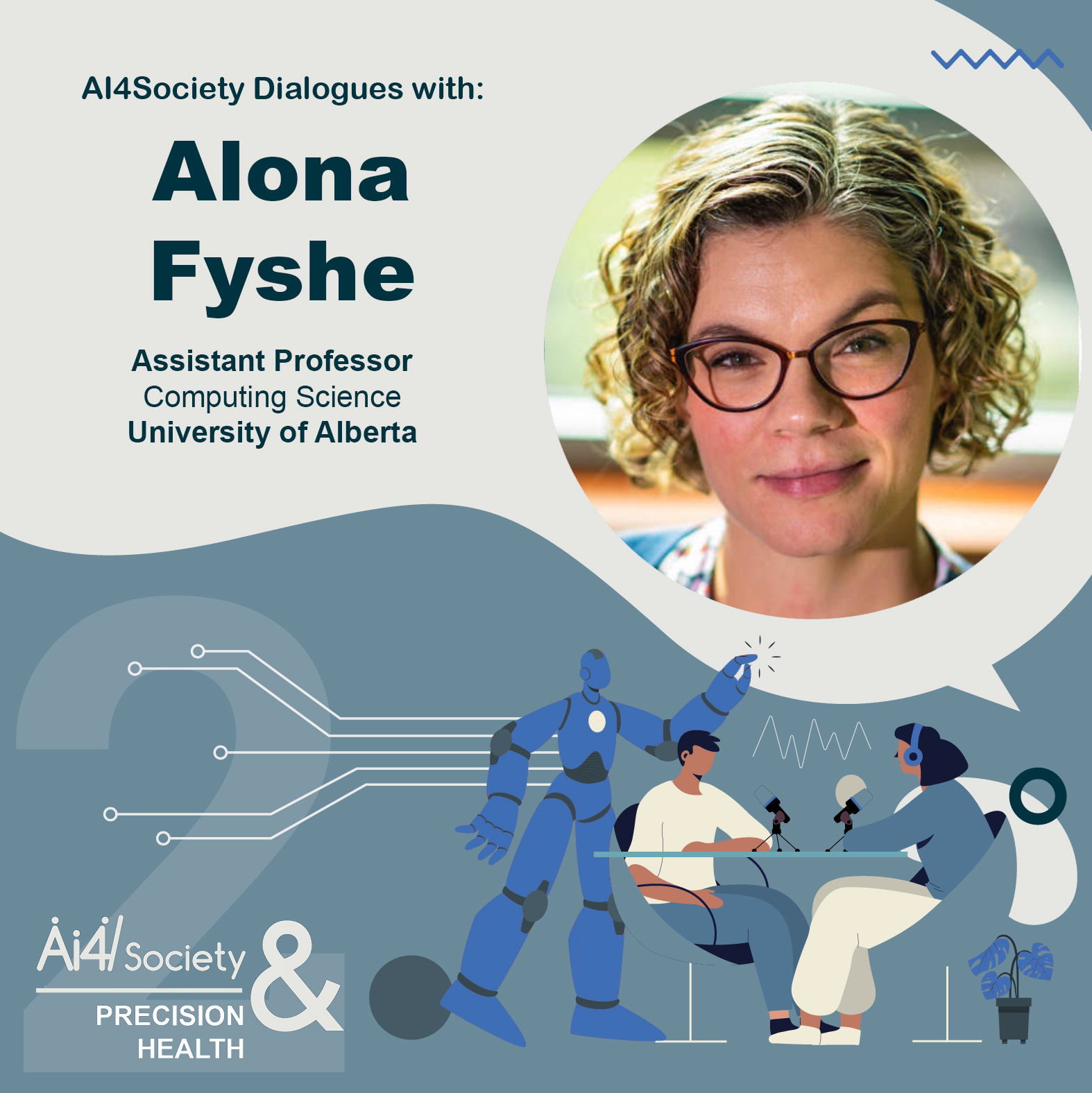
Episode One: Jana Rieger: Reinventing rehabilitation medical devices
Sometimes, the most meaningful advances in technology are about enabling simple things which can have big impacts for a patient’s quality of life. That’s what Dr. Jana Rieger has done. She’s invented a smart-enabled health tech device called Mobili-T that helps patients with something most of us probably take for granted – the ability to swallow. We talk about similarities in the creative process of research and writing a novel, how her research led to starting a company, why she chose to become an entrepreneur, how algorithms and machine learning plays into her work and why she feels “health at home” is the next big thing.
Find out more about True Angle and Mobili-T.
“I like having the open road, the null hypothesis…because you never know what you are going to find….Some of the best ideas come when you’ve left the research [itself] and are doing something else.” – Jana Rieger
Dr. Jana Rieger is a Professor in the Faculty of Rehabilitation Medicine and Director of Research at the Institute for Reconstructive Sciences in Medicine at the University of Alberta. She’s also the CEO of Edmonton based True Angle Medical Technologies. Dr. Rieger is a global leader in functional outcomes assessment related to head and neck disorders. Over her 20-year career in this field, she has held roles as a professor, clinician, researcher, and most recently, entrepreneur.
AI4Society Dialogues 2, Episode 1
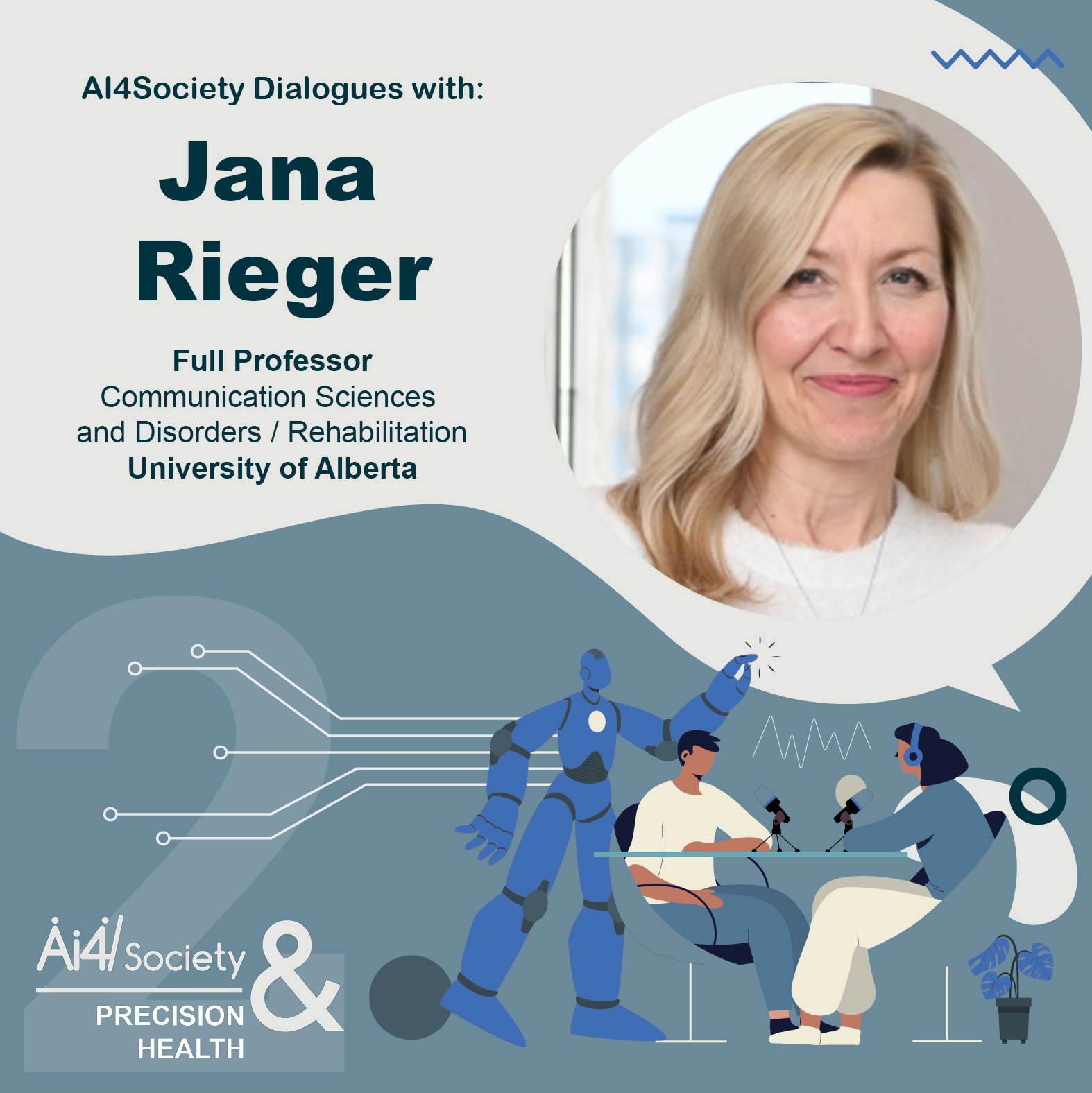
AI4Society Dialogues on Podcast platforms
About AI4Society Dialogues
AI4Society Dialogues, season two, is a co-production between two signature research areas at the University of Alberta, AI4Society and Precision Health.
Dr. Eleni Stroulia, Professor, Computer Science and Director, AI4Society
Dr. Lawrence Richer, Vice Dean, Research, Faculty of Medicine and Dentistry
AI4Society Dialogues is hosted by University of Alberta alumna, Katrina Ingram, Founder and CEO, Ethically Aligned AI
Technical Producer: Corey Stroeder
Special thanks to Kaly Vittala for research and production support.
Theme music: “Seeing the Future” by Dexter Britain
Copyright 2021 University of Alberta. All rights reserved.
AI4Society Dialogues – Season 1

AI4Society Dialogues Episode 10
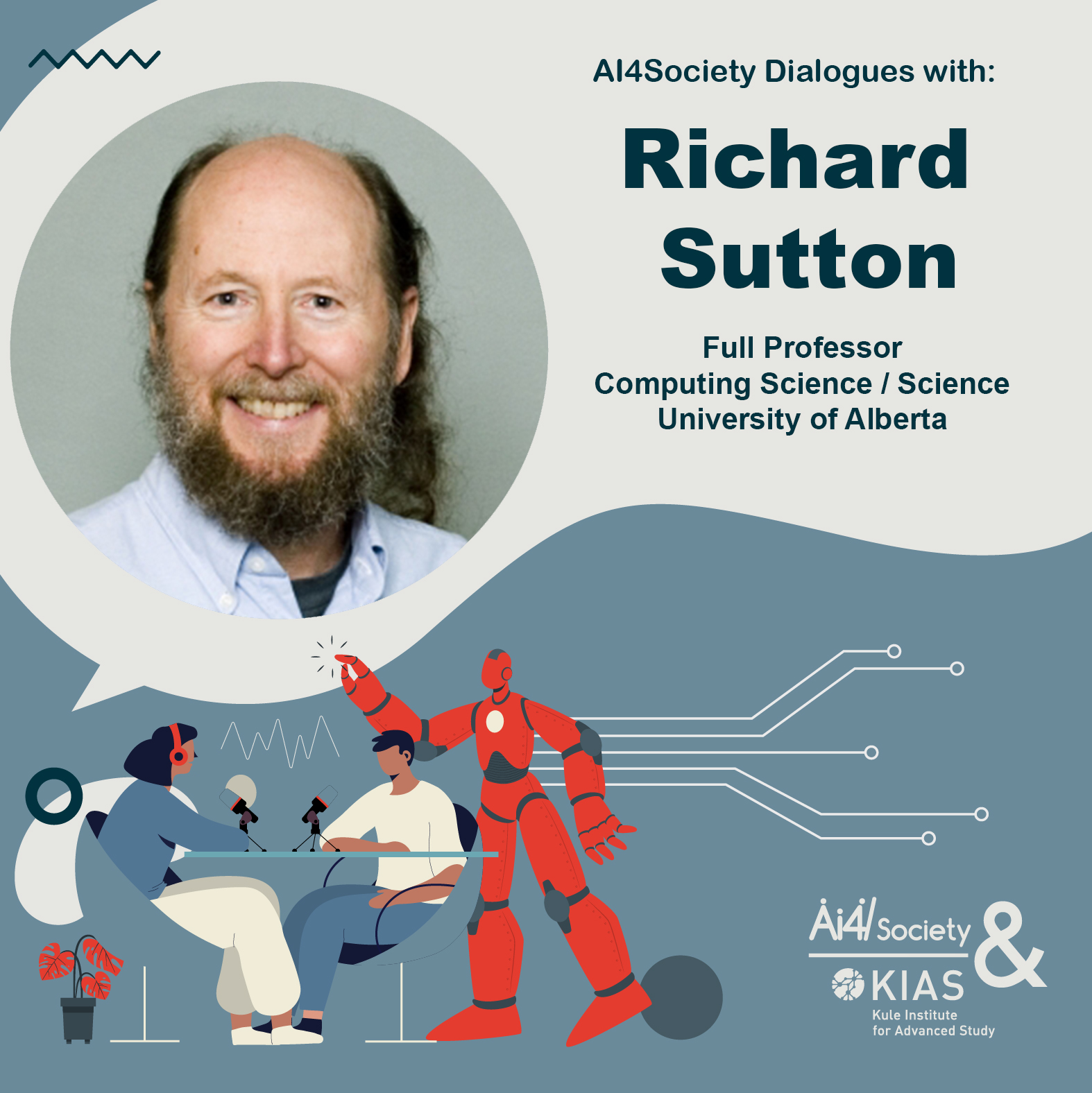
Episode Ten: Rich Sutton: Reinforcement learning and the future of AI
Can we teach AI to learn from it’s own experiences? That’s the premise behind reinforcement learning. Dr. Rich Sutton in a University of Alberta Professor in computer science and one of the leading figures in AI research today. We talk about the early days of his career, why he chose to make the University of Alberta his academic home, the benefits of not chasing fads and the importance of an interdisciplinary AI research community. We also explore reinforcement learning and how it shifts not only the ways in which we develop AI, but also how we might think about our relationship with AI.
“The data a reinforcement learning agent uses the data it generates itself…you’re an (AI) agent, you’ve done some things, you’ve seen some things, it’s your data…that’s what you learn from (in reinforcement learning).” – Rich Sutton
Dr. Rich Sutton is a distinguished research scientist at DeepMind, a professor in the department of computing science at the University of Alberta and a Fellow of the Alberta Machine Intelligence Institute (Amii). He is one of the pioneers of reinforcement learning and co-authored the textbook Reinforcement Learning: An Introduction. His research interests center on the learning problems facing a decision-maker interacting with its environment, which he sees as central to artificial intelligence.
AI4Society Dialogues Episode 9
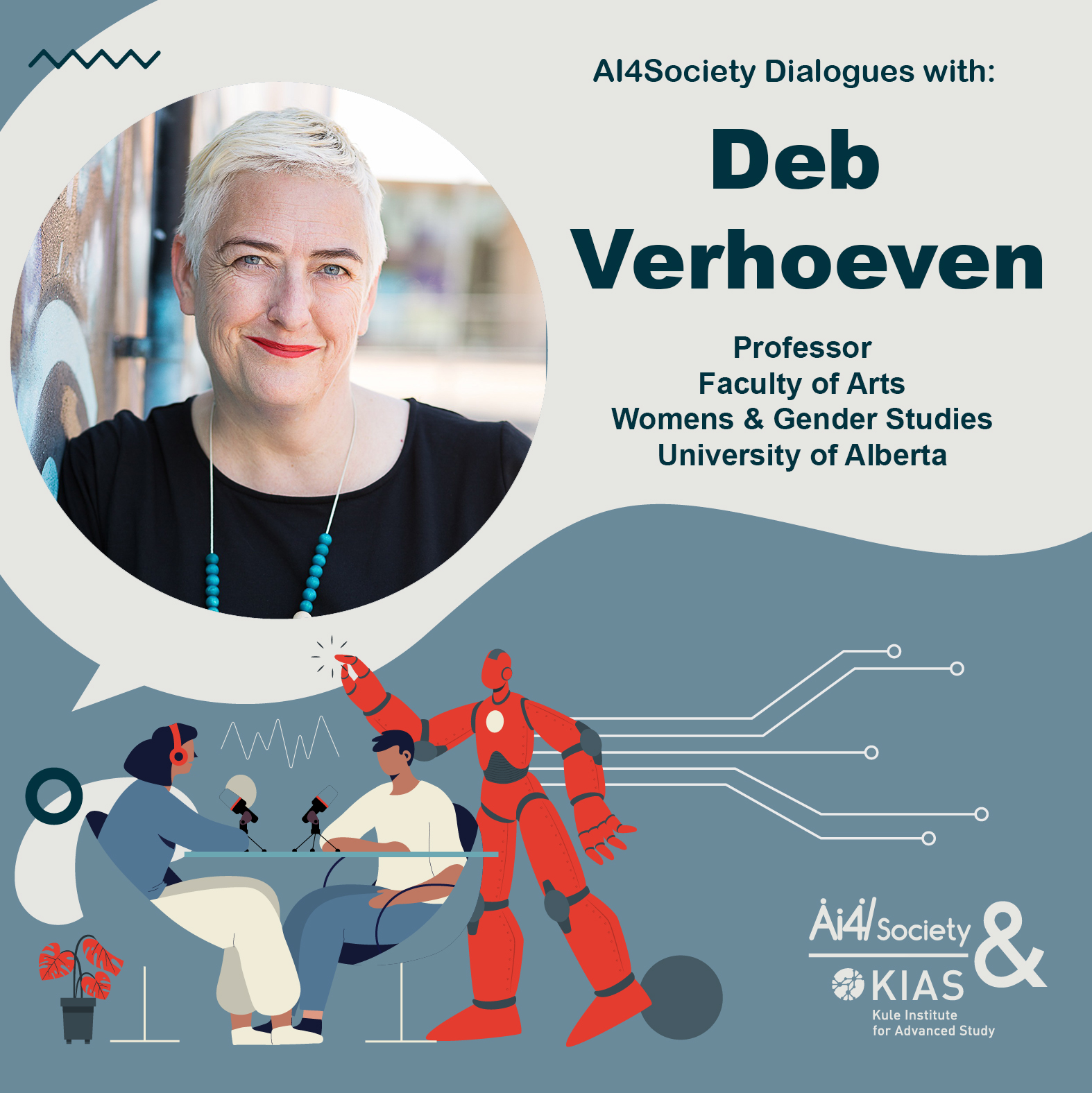
Episode Nine: Deb Verhoeven: Networked Data: Gender, Power and Relationships
How can we use the tools of big data, networks and an understanding of our digital infrastructure to shed light on power relationships and inequities? In her work as a digital humanities scholar, Dr. Deb Verhoeven is enlisting machine learning to redress the persistent domination of power elites. Her unique approaches include using criminal network analysis to identify “gender offenders” and expose “Daversity”. She’s also pioneering a new type of intervention she calls “digital infrapuncture”. We talk about big data, AI, networks, digital infrastructure, search and why Richard Davidson just might be the best name to have if you’re looking for funding.
“People think of big data as having something to with size, but size is relative. Big data stretches us to the limits of what we’re capable of…if you’re not having an existential crisis….it’s not big. Big data implicates us.” – Deb Verhoeven
Dr. Deb Verhoeven is a Professor at the University of Alberta and holds the Canada150 Research Chair in Gender and Cultural Informatics. She’s also the Director of the Humanities Networked Infrastructure (HuNI) Project and was previously Associate Dean of Engagement and Innovation in the Faculty of Arts and Social Sciences (FASS), University of Technology Sydney (UTS). Her research interest lies in extending the limits of conventional film studies; exploring the intersection between cinema studies and other disciplines such as history, information management, geo-spatial science, statistics, urban studies and economics.
AI4Society Dialogues Episode 8
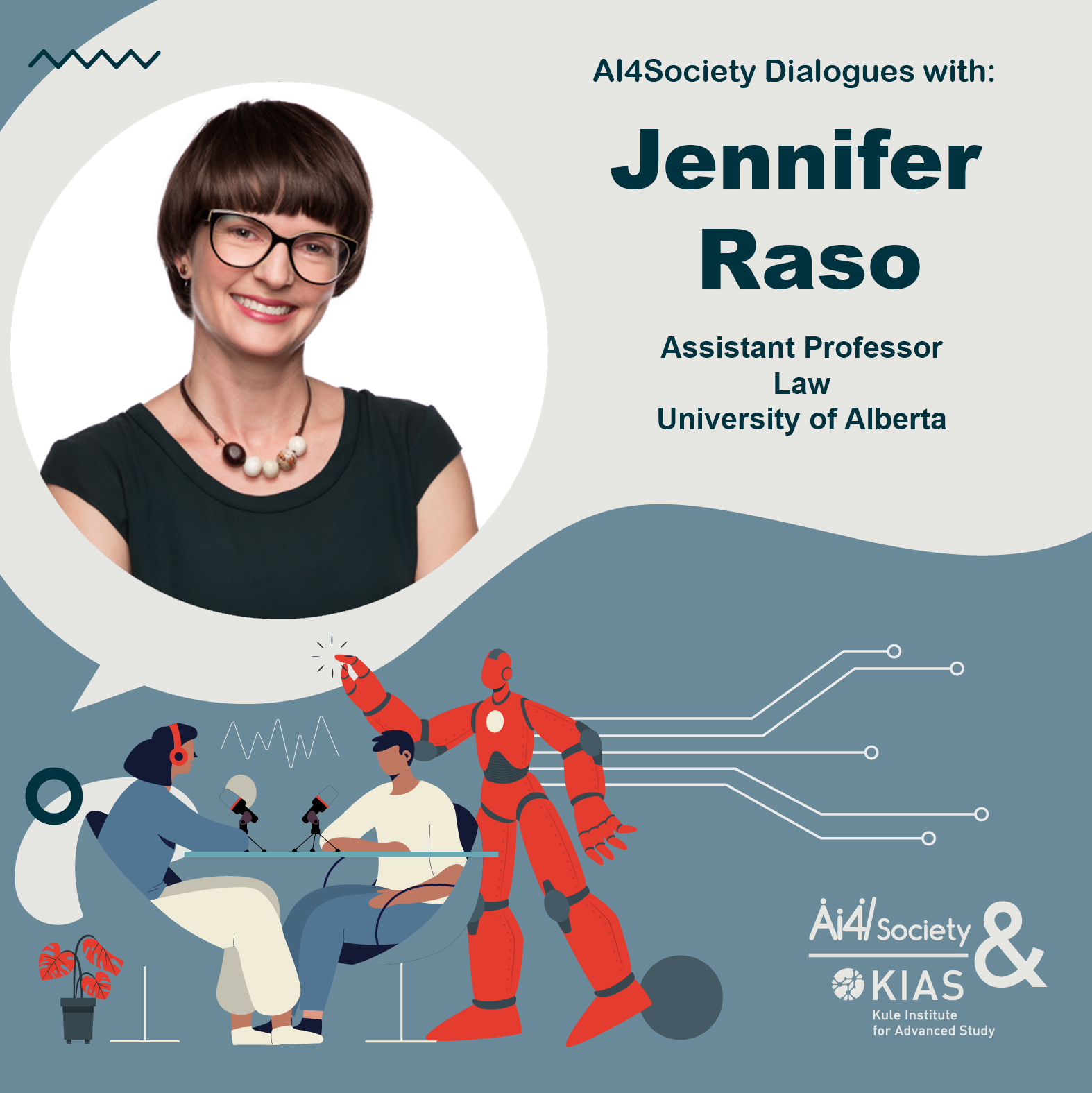
Episode Eight: Jennifer Raso: Encoding the law: technology’s impact on institutional decision making
Increasingly, automated systems are being used to aid in the delivery of important social service programs. Dr. Jennifer Raso’s work in the area of administrative law focuses on the relationship of human and non-human collaboration on institutional decision making and the resulting legal and ethical outcomes. We talk about the challenges in delivering government programs when “people’s lives are not drop down menus”. We explore how procuring and building these systems is an area for innovation and how layering AI onto the mix introduces further complexity. We also take a critical look at efficiency and cost savings and examine if technology really delivers on these promises.
“AI adds an additional layer onto what is already a situation that is hard to entangle…the focus on the AI piece obscures what is already happening.” – Jennifer Raso
Dr. Jennifer Raso is an Assistant Professor at the University of Alberta’s Faculty of Law, where she studies the relationship between discretion, data-driven technologies, and administrative law. She is particularly interested in how humans/non-humans collaborate and diverge as they produce institutional decisions, and the consequences of this arrangement for procedural fairness and substantive justice.
AI4Society Dialogues Episode 7

Episode Seven: Noah Castelo: Relating to robots
How people respond to artificial intelligence depends on their perceptions of whether or not AI is to be trusted, the context in which they encounter AI and, in the case of robots, how the AI looks. Dr. Noah Castelo, a behavioural scientist whose expertise and research into psychology and consumer behaviour are providing deeper insights into the question of how humans will relate to AI. We talk about the uncanny valley of “creepy” human-like robots, how robots are being used in customer service and how perceptions around the future use of AI in the workplace are shaping career choices for students.
“There are two big attitudes driving perception of (AI) technology…usefulness and comfort and on both we’re not quite there yet…there are major obstacles.” – Noah Castelo
Dr. Noah Castelo is an Assistant Professor in the faculty of business at the University of Alberta. As a behavioral scientist, he studies the human side of AI, focusing on questions that relate to human interactions with AI systems and how growing awareness of AI in general changes how humans treat each other.
AI4Society Dialogues Episode 6

Episode Six: Nidhi Hegde: Privacy, Ethics and AI
The use of artificial intelligence across many high risk domains is raising many ethical questions. This includes issues around privacy and biases in data as well as questions about equity and inclusion. Dr. Nidhi Hegde is an Assistant Professor at the University of Alberta whose work is helping to drive new approaches in differential privacy. We talk about the challenges in managing data for privacy, as well as times when we might want to securely share our data. We also dive into the topic of gender and equity with personal insights on being a female AI researcher and how to foster greater participation and inclusion.
“The general public might think it’s a far off, futuristic idea, but in fact it’s all around us…and I think there needs to be a greater data literacy… It’s not Terminator, but it is that search algorithm…there’s this sense of a sort of mystical idea about AI…and I wish that people would understand… it’s a technology and it can be used for many purposes just like any technology. ” – Nidhi Hegde
Dr. Nidhi Hegde is an Associate Professor in the department of Computing Science at the University of Alberta. Recently she had been a Research team lead at Borealis AI. Her research interests lie in probabilistic modelling and algorithmic design of machine learning for networks and systems. She has particular interest in privacy and ethics of AI.
AI4Society Dialogues Episode 5
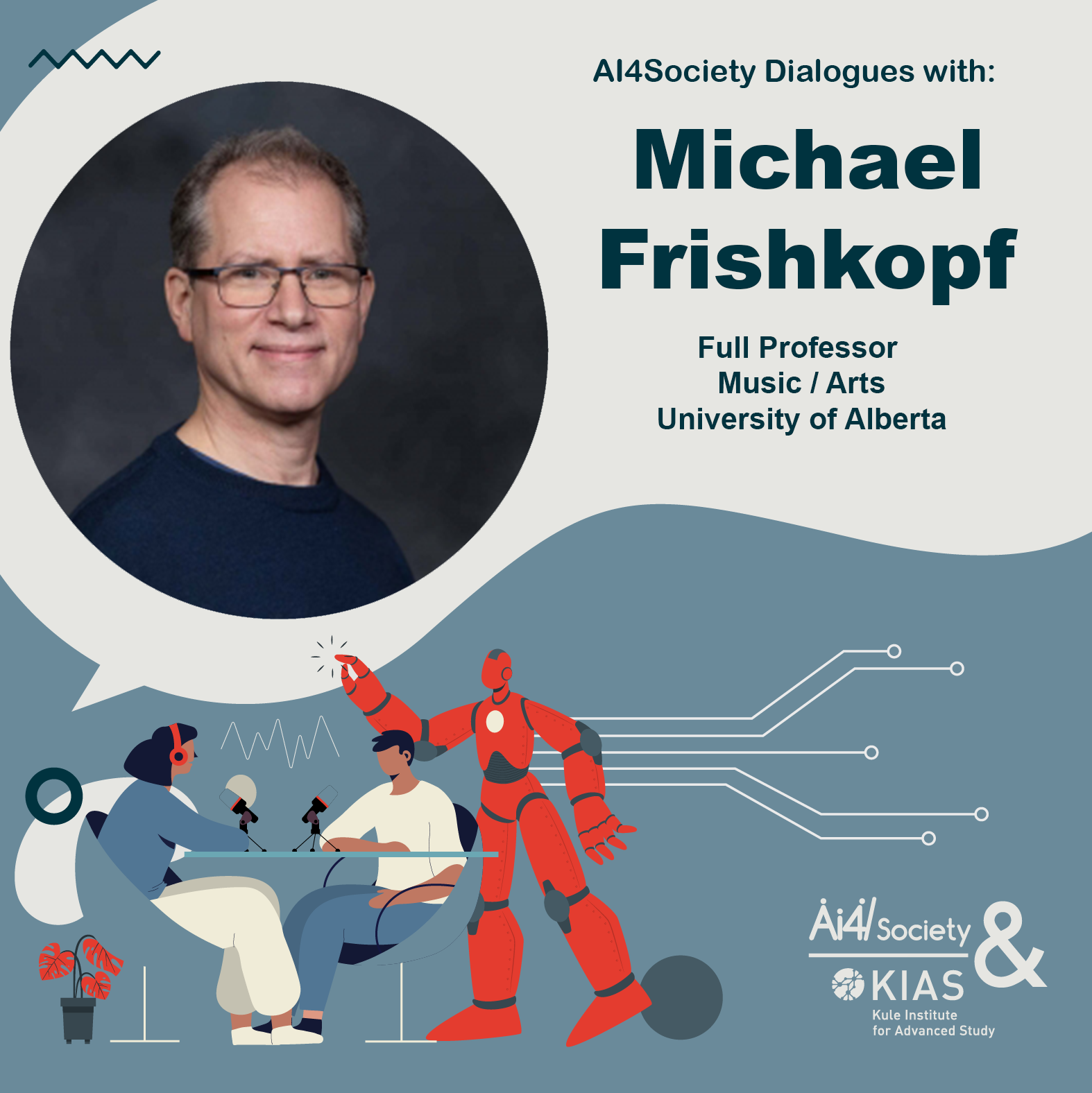
Michael Frishkopf: Advancing ethnomusicology with AI
Music and sound are fundamental aspects of how we interact with the environment and play an important role in shaping culture. Dr. Michael Frishkopf is an ethnomusicologist who is deploying the power of AI to formulate and test new hypotheses about the relationship between music and culture, speech and individuality. In this wide ranging conversation, we cover the relationship between math and music, the tough challenges of applying machine learning to sound, how the evolution of music technologies impacts culture, and what we can learn from sound in cyberworlds.
“Everybody goes around recording these days….the problem is how do you categorize these things?…If you could develop good artificial intelligence machine learning tools, then you could do something like Alan Lomax was trying to do (build an ethnomusicology recording archive).” – Michael Frishkopf
Dr. Michael Frishkopf is a Professor of Music at the University of Alberta, an ethnomusicologist, performer, and composer. Dr. Frishkopf’s ethnomusicological research interests include music of the Arab world; Sufi music; sound in Islamic ritual performance; music and religion; comparative music theory; the sociology of musical taste; social network analysis; (virtual [world) music]; digital music repositories; deep learning for sound recognition and music information retrieval; music in West Africa; participatory action research; psychoacoustics and music cognition; music and global health; indigenous medicine and music as medicine for integrative health; and music for global human development and social change.
AI4Society Dialogues Episode 4
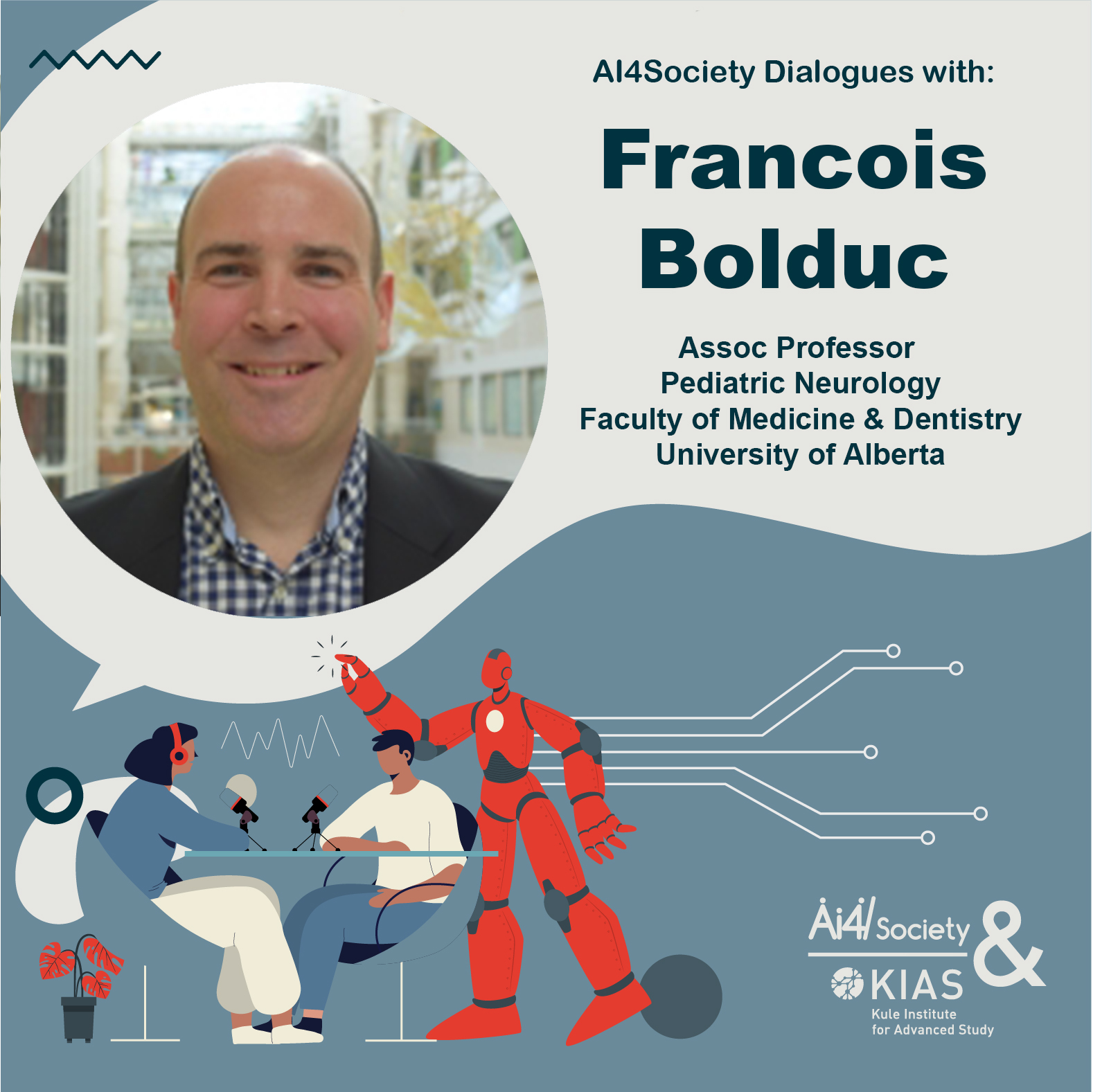
Francois Bolduc: Genetics, chatbots and the future of medicine
Artificial intelligence is having significant impacts on advancing medical research. Dr. Francois Bolduc is a pediatric neurologist, with deep expertise in understanding the genetic basis of memory and cognition. As both a clinician and researcher, Dr. Bolduc is using artificial intelligence to advance his research as well as serve patients. We talk about the role of big data and AI in genetic research and the challenges and opportunities in working as part of an interdisciplinary team. We also discuss how a chat bot developed by Dr. Bolduc’s team is helping autistic children and their parents by providing a medically sound, ongoing support system.
“One thing that AI brought is the ability to manage very complex data. We always had to reduce the information (about a patient), to some degree, to keep it within our working memory…what AI allows is these “external brains”….people are very complex and with AI, we are trying to capture all their information and not be biased in our selection criteria.” – Francois Bolduc
Dr. Francois Bolduc is an Associate Professor of pediatrics in the Faculty of Medicine and Dentistry at the University of Alberta. His work focuses on identifying the molecular mechanisms underlying cognitive, behavioral, and social defects in patients with neurodevelopmental disorders (NDD). He leads a lab that has developed several paradigms in Drosophila to model and quantitatively study the various defects seen in neurodevelopmental and neurodegenerative disorders. His team is using artificial intelligence (AI) to better understand the complex interactions modulating behavioral outcomes in animal models and human as well as developing a chatbot to better provide information to parents, health professionals, and educators involved with individuals with NDD.
AI4Society Dialogues Episode 3
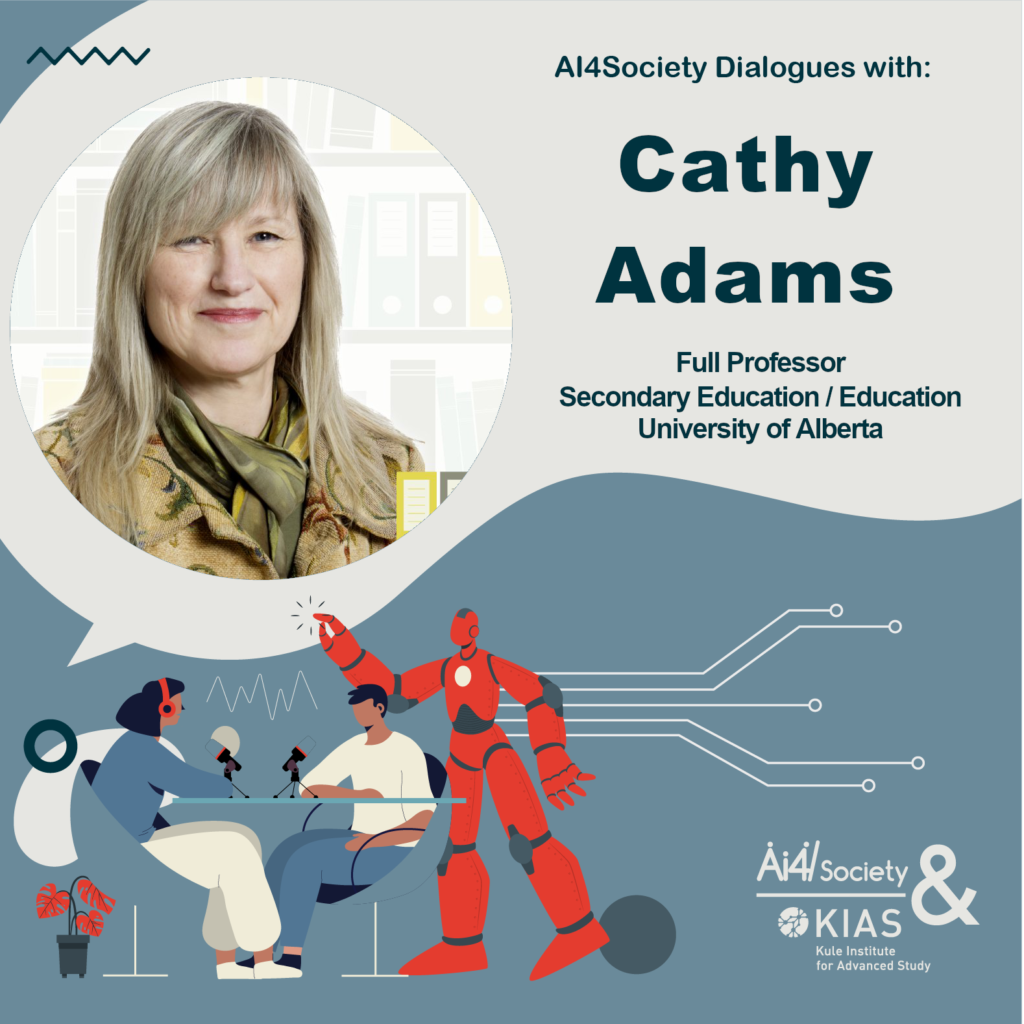
Cathy Adams: Digital technology: the next killer app for education
When we think about technology and education, we often think about the ways in which we learn through technology, but we may not see how technologies shape education itself. Dr. Cathy Adams has been working at the intersection of education and technology, investigating how digital technologies shape knowledge practices. We reflect on the past, and how the now ubiquitous PowerPoint presentation has shaped learning. Looking to the future, we discuss the opportunities and challenges for AI technologies in education and their profound impacts that extend far beyond the classroom.
“As AI and machine learning are able to make more and more smart decisions for us we will increasingly be willing to off-load our own decision making to these technologies.” – Cathy Adams
Dr. Cathy Adams is a Professor and Vargo Teaching Chair in the Department of Secondary Education. Her research addresses digital technology integration across K-12 educational environments, with a focus on ethical, pedagogical and sociocultural issues. She teaches graduate and undergraduate courses on pedagogy of technology, educational technology integration, and computational thinking for teachers.
AI4Society Dialogues Episode 2

Michael Bowling: Game changing AI research
As constructed environments with clear parameters, games are an ideal proving ground for artificial intelligence research. Dr. Michael Bowling is equally passionate about games and AI. From his early days of robot soccer, to building an AI program and winning the World Championship of Poker (twice!) to his current research into theory of mind influenced by the cooperative card game Hanabi, Dr. Bowling takes a playful approach in using games to solve big, complex, challenges.
“We (as humans) can communicate a great deal by letting the background information or the inferences communicate the information…we do not have any computer algorithms that do that….(but) could a game help us get there?….We’re actually starting to make progress which is really exciting.” – Michael Bowling
Dr. Michael Bowling is a professor in Computing Science, Fellow in the Alberta Machine Intelligence Institute, and a senior scientist at DeepMind. His research is driven by his fascination in the problem of how computers can learn to play games through experience. He led the Computer Poker Research Group, which has built some of the best poker playing programs in the world.
AI4Society Dialogues Episode 1
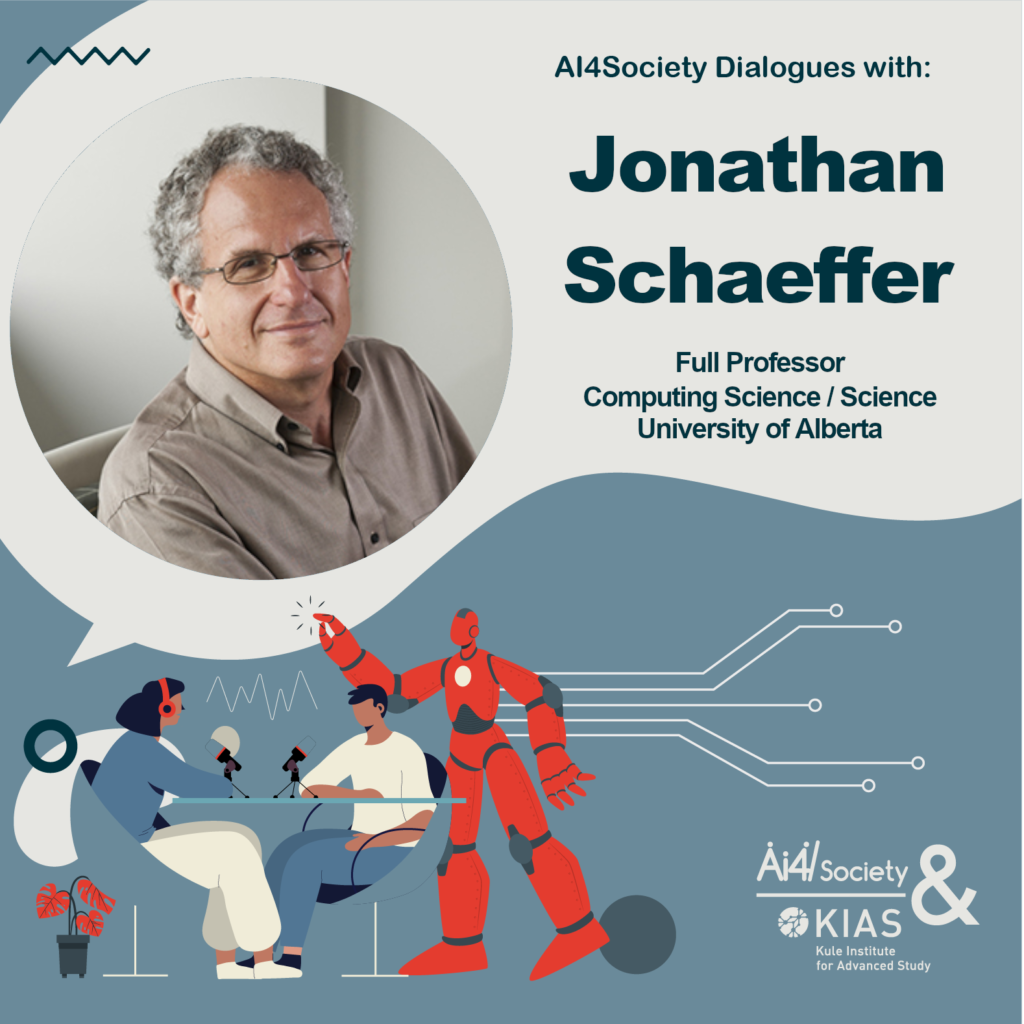
Jonathan Schaeffer: Building an AI research powerhouse at the University of Alberta
How did the University of Alberta become a global leader in AI research? Dr. Jonathan Schaffer shares his personal account of how a community of like minded individuals, early government support and world record setting research set the stage for Alberta to play a leading role in AI research today. We talk about his “ta da” moment in solving the game of checkers with perfect play, why he thinks AI ethics are such an important topic and his latest project – a new book aimed at non-technical audiences.
“No discipline will be untouched by AI. It’s AI and X…choose your X.” – Jonathan Schaeffer
Dr. Jonathan Schaeffer is a Distinguished University Professor of Computing Science at the University of Alberta, and the former Dean of Science. His checkers-playing program Chinook was the first computer to win a human world championship (1994), a feat recognized in the Guinness Book of World Records.
AI4Society Dialogues TRAILER
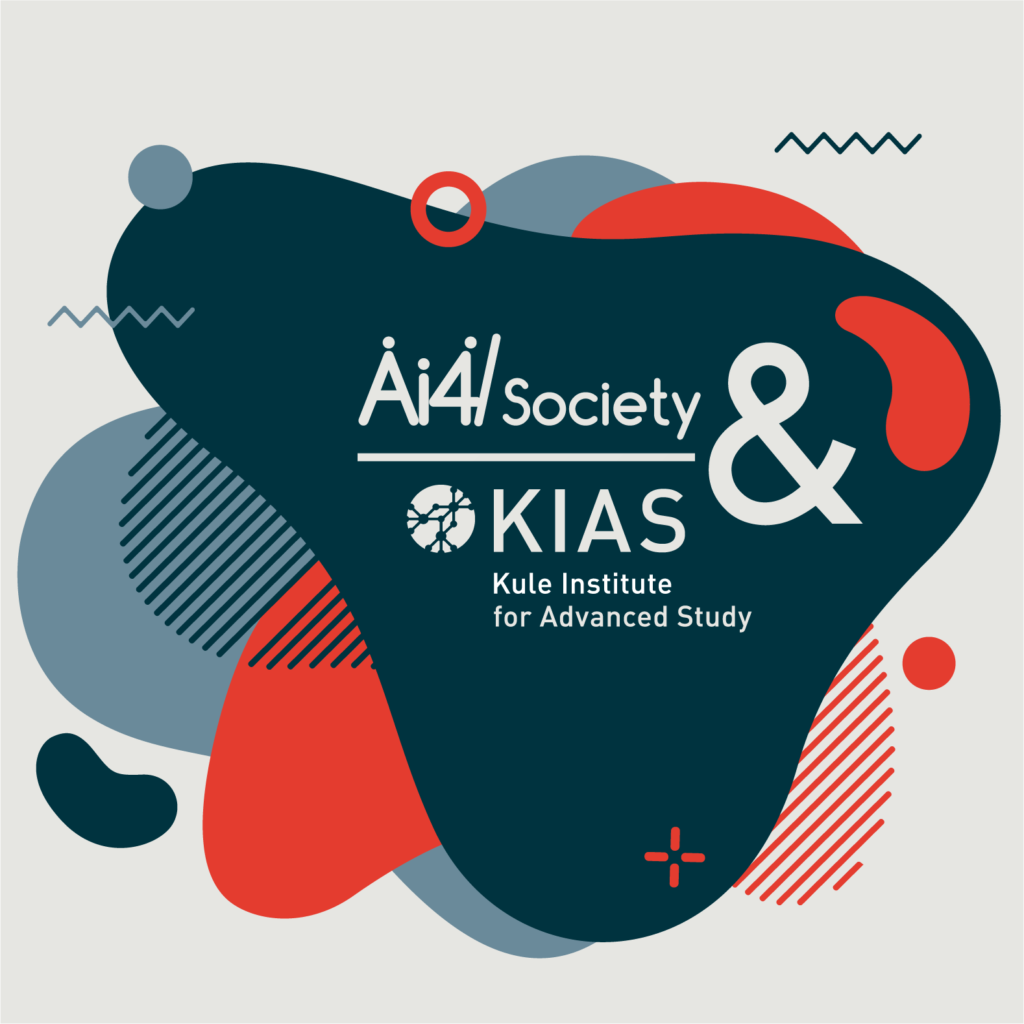
AI4Society Dialogues is a new podcast that takes you behind the scenes to meet some of the talented researchers who are constructing and using AI in ways that will shape our world. This trailer provides a quick overview of our first three episodes. Dr. Jonathan Schaeffer kicks off the series by taking us back to the early days of the University of Alberta computer science department, Dr. Michael Bowling shares how he has applied his love of AI and passion for games in his world class research into poker and Dr. Cathy Adams takes us into the realm of education and how technologies, including AI, are fundamentally reshaping what we teach and how we learn.
AI4Society Dialogues on Podcast platforms
About AI4Society Dialogues
AI4Society Dialogues is a co-production between AI4Society, a signature research area at the University of Alberta and the Kule Institute for Advanced Research (KIAS), an endowed institute at the University of Alberta that supports research in the social sciences, humanities and fine arts.
Host: Katrina Ingram, Founder and CEO, Ethically Aligned AI
Technical Producer: Corey Stroeder
Special thanks to Dr. Scott Smallwood and the Sound Studies Institute at the University of Alberta for providing recording space.
Theme music: “Seeing the Future” by Dexter Britain
Dr. Eleni Stroulia, Professor, Computer Science and Director, AI4Society
Dr. Geoffrey Rockwell, Professor, Philosophy and Digital Humanities, Director, Kule Institute and co-Director, AI4Society
Copyright 2020 University of Alberta. All rights reserved.
